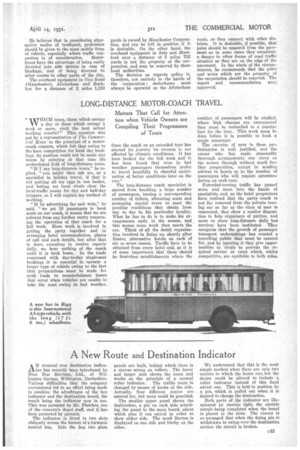LONG-DISTANCE MOTOR-COACH TRAVEL
Page 65

If you've noticed an error in this article please click here to report it so we can fix it.
Matters That Call for Atten tion when Vehicle Owners are Compiling Their Programmes of Tours " WHICH tours, those which occupy a day or those which occupy a week or more, yield the best actual working results?" This -question was put by a representative of The Commercial Motor to the principal of a motorcoach concern, which felt that owing to the keen competition for local day bookings, its position could not be made any worse by entering at that time the undeveloped field of long-distance tours.
"If I say long-distance tours," he "you might then ask me, as a specialist in holiday travel, if that is not putting all my eggs in one basket, and letting my local rivals clear the local-traffic roosts for day and half-day trippers, so I will explain my method of working.
"If by advertising far and wide," he said, "we get 18 passengers to book seats on our coach, it means that we are relieved from any further worry concerning the operation of that coach for a full week. More work is involved In getting the party together and in arranging hotel accommodation, places of call and such details, but after that is done, excepting to receive reports daily, we bear nothing of the coach until it is back home. In the trade concerned with day-to-day single-seat bookings it is essential to operate a larger type of vehicle owing to the fact that preparations must be made for peak loads to counterbalance losses that occur when vehicles are unable to take the road owing to bad weather.
Once the coach on an extended tour has started its journey its revenue is not affected by climatic conditions. It has been hooked for the full week and it has been found that even in bad weather passengers themselves prefer to travel hopeftilly in cheerful anticipation of better conditions later on the tun."
The long-distance coach specialist is spared from handling a large number of passengers, issuing a corresponding number of tickets, allocating seats and arranging special tours to meet the peculiar couditious that obtain from day to day in his particular locality. What he has to do is to make his arrangements early in the season, and this means more work than meets the eye. Think of all the detail organization involved in fixing up, shortly after Easter, alternative hotels on each of six or seven routes. Tariffs have to be obtained from every hotel mid, as it is of some importance that these should be first-class establishments where the comfort of passengers will be studied, where high charges are encountered they .must be reconciled to a popular fare for the tour. This work must be done before it is possible to book a single passenger.
-The exercise of care in these preliminaries is well justified, and the owner who has made reasonably thorough arrangements' can carry on the season through without much further preparation, except in sending advices to hotels as to the number of passengers who will require accommodation on each tour.
Extended-touring traffic has passed more and more into the hands of specialists and, as the hotel proprietors have realized that the party coach is not far removed from the private touring ear so far as the class of user is concerned, they show a readier disposition to help organizers of parties, and more so since long-distance daily bus services have been instituted: They recognize that the growth of passenger transport undertakings has created a travelling public that must be catered for, and by ignoring it they give opportunities to rivals to provide the required service at rates which, whilst competitive, are equitable to both sides.












































































































